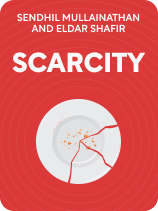

This article is an excerpt from the Shortform book guide to "Scarcity" by Sendhil Mullainathan and Eldar Shafir. Shortform has the world's best summaries and analyses of books you should be reading.
Like this article? Sign up for a free trial here.
How does being in a state of scarcity change your behavior and decision-making? What are the long-term effects of living in scarcity?
In their book Scarcity, Sendhil Mullainathan and Eldar Shafir explain how being in a state of scarcity temporarily changes the brain’s functioning and decision-making. Specifically, they highlight two areas where our decisions are most impacted by scarcity: time and money.
Keep reading to learn about the psychology of scarcity, according to Sendhil Mullainathan and Eldar Shafir.
Scarcity Makes Us More Efficient
To begin unraveling the impact of scarcity on our brains, we’ll first explain how scarcity helps us do more with less. In their book Scarcity, Sendhil Mullainathan and Eldar Shafir explain the psychology of scarcity in terms of how we behave when we have less than we need. (Shortform note: The authors’ definition of scarcity is key to understanding their ideas because it’s based on our perception of what we have rather than the physical reality of what we have. In other words, anyone can experience scarcity, regardless of how much wealth or time they have compared to others. This differs from other common definitions of scarcity that define it as the physical reality of something being “not plentiful or abundant.”)
The authors argue that once we perceive scarcity, that perception automatically focuses the mind, involuntarily channeling all of our mental energy into coping with that scarcity. In this section, we’ll look at how scarcity makes us more efficient when we’re short on time and money. The authors refer to this enhanced efficiency as the “focus dividend.”
(Shortform note: In Thinking, Fast and Slow, Daniel Kahneman categorizes this type of involuntary brain activity as System 1 thinking, as opposed to methodical and analytical System 2 thinking. Although he doesn’t attribute scarcity as a trigger for System 1 thinking, he does follow a similar logic to Mullainathan and Shafir: He claims that if we can recognize System 1 thinking as a natural tendency (like our brains in scarcity mode), we can then use more deliberate System 2 thinking to compensate for those automatic responses.)
Using Scarce Time Efficiently
When we have an abundance of time to complete something, we tend to work slowly, get distracted, and procrastinate. It’s often only when we realize we’re running out of time that we suddenly find the motivation to complete something quickly. People also work more effectively when they’re under a time crunch (not just faster). In the authors’ research studies, people proofread faster and more accurately when they were given shorter weeklong deadlines for three different tasks, as opposed to three weeks to complete all three tasks.
(Shortform note: Unlike Mullainathan and Shafir, who emphasize the burst of productivity we experience when a deadline is near, Daniel H. Pink recommends in When that we take advantage of the “fresh start effect,” the phenomenon where we feel more optimistic and capable at the beginning of a project or process. Pink suggests that this principle applies on smaller time scales, like the beginning of a week, or larger time scales, like the beginning of a new job.)
Mullainathan and Shafir also suggest that scarce time changes the way we perceive the world. They claim that we enjoy things more when we only have a limited time for an activity, as opposed to when we feel there’s an abundance of time. (Shortform note: In Influence, Robert Cialdini links this idea to our natural tendency toward loss aversion. He claims that we find things more appealing when they’re in limited supply because we’re motivated to avoid missing out on the scarce entity. Similar to Mullainathan and Shafir, Cialdini also argues that our brains take a mental shortcut by automatically assigning value to anything scarce.)
Mullainathan and Shafir cite one study showing that when college seniors perceived that they had scarce time left at college toward the end of the year, they spent more time engaged in college activities, were happier, and appreciated their time more (compared to when they perceived the end of the year as a long way off). (Shortform note: The authors don’t mention some of the confounding variables in this study. For example, the college seniors may have had a smaller workload toward the end of the year, which may have influenced their overall experience of happiness and engagement in other activities.)
Using Scarce Money Efficiently
Mullainathan and Shafir explain that similar to the way that scarce time makes us more efficient, financial scarcity forces people to become experts at making a dollar stretch further. Poor people tend to make more rational economic decisions because scarcity forces them to make every dollar count. With each purchase, they have to consider what else they’ll have to give up to cover the cost. On the other hand, when we have enough money that we don’t have to analyze every dollar spent, we’re more susceptible to biases and inconsistencies.
(Shortform note: Although the authors don’t explicitly mention this nuance, their argument here only seems to apply to economic decisions with short-term consequences, like buying a cheaper item in a grocery store, which results in immediate savings. Later, the authors argue that poor people make worse economic decisions in situations where there are long-term consequences to consider, like taking out loans.)
For example, wealthy people (those who don’t experience scarcity when it comes to money) are more susceptible to relativity bias. This is the phenomenon where someone is willing to go out of their way to save $5 on a $20 purchase, but not willing to do so to save $5 on a $100 purchase. The savings are the same in both situations, but the lower relative savings as a proportion of the total cost makes wealthier people feel like it’s not worth the effort.
Mullainathan and Shafir write that poor people are also more aware of the prices they’re paying, they’re conscious of when they save or lose money by buying a larger volume, and they’re more likely to factor in the opportunity cost of an activity (what you lose by not doing something different). For example, they’re more likely to be aware that commuting a long distance to purchase an item on sale may not be worth the time they could spend doing other things, like working, if they purchase it somewhere closer.

———End of Preview———
Like what you just read? Read the rest of the world's best book summary and analysis of Sendhil Mullainathan and Eldar Shafir's "Scarcity" at Shortform.
Here's what you'll find in our full Scarcity summary:
- An exploration of the good and bad sides of a scarcity mindset
- Strategies to counteract the negative cognitive effects of scarcity
- How policymakers should redesign social programs






